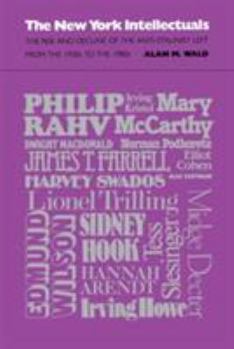The New York Intellectuals: The Rise and Decline of the Anti-Stalinist Left from the 1930s to the 1980s
Select Format
Select Condition 
Book Overview
In contrast to other scholars who emphasize the affinity of the ""New York Intellectuals"" for literary modernism and its largely Jewish composition as its defining characteristics, Wald finds these traits to be secondary to the group's agonizing efforts in the 1930s and after to build a Marxist alternative to the official Communist movement. Wald presents an absorbing account of this misunderstood chapter in the history of literary radicalism and...
Format:Paperback
Language:English
ISBN:0807841692
ISBN13:9780807841693
Release Date:May 1987
Publisher:University of North Carolina Press
Length:456 Pages
Weight:1.60 lbs.
Dimensions:1.4" x 6.0" x 9.0"
Customer Reviews
1 rating
Scoundrel Time
Published by Thriftbooks.com User , 22 years ago
This book is a good chronicle of the milieu of Cold War Liberals who provided a sophisticated democratic rationale for the Cold War and the political repression of the McCarthy era and who are the most responsible for the demonization of Communists in intellectual circles. In recent times their mentor and hero was President Reagan who gave James Burnham the Medal of Freedom along with Whittaker Chambers-thus their pretensions to being "left-wing" are about as credible as their less generic genuflections before the altar of Leon Trotsky.This intellectual banditry and collusion with the forces of repression has nothing in common with traditions of authentic libertarian socialism. James P. Cannon, in particular, the founder and long time leader of the Trotskyist movement in the U.S., who unlike Lillian Hellman never had any illusions about the charachter of the Stalin regime and who before founding this movement had played in the 1920s a leading role in the struggle in defense of Sacco & Vanzetti as a Communist leader of the International Labor Defense, took a dim view of these kind of turncoats and fair-weather friends as reflected in his essay from the early 1950s, "Treason of the Intellectuals" contained in his anthology "Notebook of an Agitator", where he denounced those who were leaving both the CP and his own organization, and the progressive movement generally, to jump on the bandwagon of the anti-communist witch-hunt, some like Edward Dymytrk going so far as to inform on their former comrades, in addition to making false and demagogic accusations against others, as nothing but cowardly and corrupt opportunists, scabs, finks and traitors. Cannon always distinguished between opposition to Stalinism and anti-communist redbaiting, the latter of which he always emphasized was part of corporate management's strategy to confuse and divide the working class and suppress basic democratic rights. Thus this milieu is rightly viewed today by progressives as discredited and philistine, representing the views and interests of Wall Street and official Washington.






